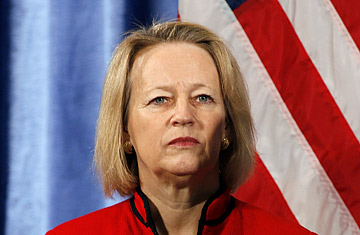
Head the Securities and Exchange Commission, Mary Schapiro
If she wasn't so successful, you could almost feel sorry for Mary Schapiro, the new chief of The Securities and Exchange Commission. As soon as she settles in at Washington's most beleaguered agency — she was sworn at the SEC's offices Tuesday morning — Schapiro will have two makeovers to handle: the first, the demoralized and embarrassed agency, and the second, herself.
Everyone's betting on Schapiro, the country's new top financial cop, to rally the weakened financial regulatory body, as beaten up as the investors it's suppose to protect. But even before stepping through the SEC's F Street doors she had to take a few knocks herself about how good, and tough, she really is. (See pictures of the demise of Bernard Madoff.)
The street cred is definitely there, she being the first person to head both the Commodity Futures Trading Commission and the Financial Industry Regulatory Authority (FINRA), two large non-government industry regulatory bodies, and also a former SEC commissioner under Ronald Reagan. There are no disputes about her leadership qualities or her fine reputation as a consensus builder in the clubby world of financial agencydom. But even her strongest supporters, like Senate finance leader Sen. Charles Schumer of New York wonder aloud if she has what it will take, if she's "willing to take no prisoners?"
"The first thing I will do is take the handcuffs off, get investigations started immediately," Schapiro answered Schumer during her mid-January Senate nomination hearing. She bluntly added, "there will be no sacred cows."
Sounds like a good cop, but SEC followers, like Columbia law professor John Coffee, says she'll need an even tougher bad cop, too, if she wants to succeed in restoring faith in the agency, and the economic system. (See the top 10 financial crisis buzzwords.)
"She's probably not known as a hard as nails enforcer, so what will be key is who she brings in to head enforcement," says Coffee, a specialist in corporate and securities law. "It has to be someone strong, this will send a signal, this will be a symbol of unequivocal enforcement. A tough prosecutor will be a big, big help to her, and the agency needs that now."
She'll need more than one tough enforcement hombre, too; she'll need to resuscitate the SEC's rank and file enforcement officers, the numbers of which have steadily eroded while the complexity of the job has increased.
According to SEC figures, enforcement levels went from 1,232 full-time employees in 2005 to this year's budget request for 1,093, an 11% drop. In the compliance office, the numbers went from 851 full-time staffers in 2005 to this year's request for 796, a 6.5% decline. (See pictures of the top 10 scared traders.)
These declining figures are in contrast to the growing mountain of financial entities that need watching, including 12,750 companies that file securities, 10,800 registered investment advisers, 4,735 investment companies, and 6,000 broker/dealer firms, according to SEC figures.
Early last year, Democratic Congressman Barney Frank of Massachusetts saw the opposing trends and wanted to add an extra $30 million to the kitty, while Sen. Jack Reed, a Rhode Island Democrat, and other Senators wanted to ante up another $50 million. This year, the House approved an SEC budget of $928 million, while the Senate approved $938 million, a 2% to 3% increase, which is greater than the 1% hike former chairman Christopher Cox requested from the 2008 budget of $906 million. The final budget, part of the government's "Continuing Resolutions," has yet to be approved.
Even three former SEC chairmen, William Donaldson, Arthur Levitt and David Ruder have said that the SEC "lacks the money, manpower, and tools it needs to do its job," according to Senate documents in May of last year,
"You never have enough people, but if you could bump up enforcement levels, say, 20%, it would make a huge difference," says Bruce Carton, former senior counsel in the SEC's Division of Enforcement, and editor of online securities enforcement publication, Securities Docket. "Tweaking policies won't replace more manpower and training," says Carton. "It's one thing to have more enforcement people on the ground, but they have to be trained to know what to look for, too."
